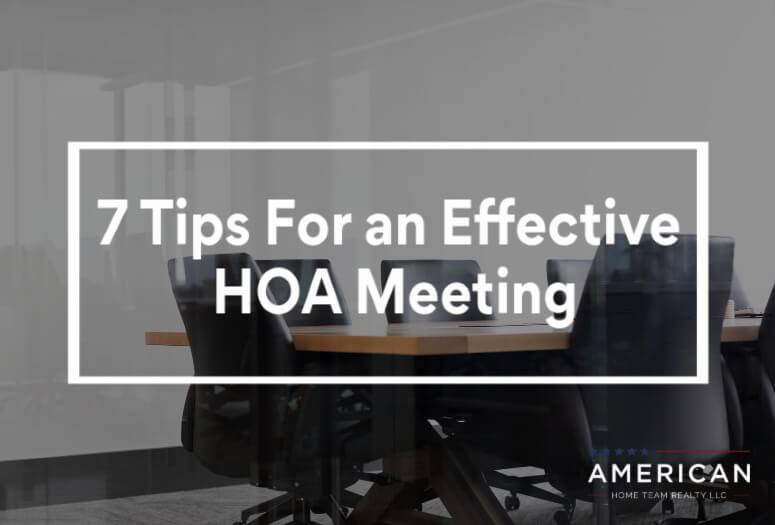HOA meetings can be a nightmare.
Conflicting opinions, disgruntled owners, and overall disorganization can threaten even the best-planned meetings.
A homeowner’s association board is a group of elected individuals, chosen by the “members” (or homeowners) of a particular community to handle a multitude of tasks. Some of these tasks include finance management, vendor hiring and firing, rule enforcement, and maintenance, just to name a few.
Think of any community you’ve lived in with an HOA…the land was probably maintained well and you may have received some monthly or quarterly updates about happenings. Keeping a community running at peak performance is hard work, which inevitably falls on the HOA board.
HOA meetings are how they get it all done.
HOA management companies can assist greatly in running an effective HOA meeting, taking the responsibility out of the hands of the owners to keep meetings efficient and professional. Here, you’ll find some important tips and tricks to keep everything on-topic and have the most effective HOA meeting possible.
1. Set Guidelines
One of the most important aspects of running an effective HOA meeting is setting expectations and guidelines, so HOA board members don’t steamroll the entire proceedings.
When many opinions exist on a subject (and individuals feel inclined to share), there must be some order. HOA meetings should not be a complete “town hall,” where individuals can voice concerns with reckless abandon.

Homeowners must respect the process and be a part of the organizational flow. HOA meetings are an opportunity for homeowners to express thoughts and opinions to the HOA board members as well as any HOA management company or representative.
Guidelines for participation should include how long individuals can openly speak, what subjects are acceptable, and the official timeline of the meetings, so all parties know exactly what opportunities there are for open discussion, and when the HOA meeting is pivoting to a new topic.
2. Create an Agenda…and Stick to It
Scheduling can be increasingly difficult as more individuals are involved. Creating an HOA board meeting agenda can be the difference between chaos and peaceful proceedings.
Board meetings are stressful and emotions can run high. Many individuals (especially disgruntled homeowners) attend the HOA board meetings to air grievances or merely make themselves heard.
In order to weed out some of those distractions, an agenda will be critical. Plan out the exact flow of the meeting and most importantly, stick to it. Staying consistent with board meetings can add professionalism to your HOA meetings, maintaining the flow at all times so you can get things done.
3. Take Meeting Minutes
Accountability, accountability, accountability!
HOA meetings can go “off the rails” at times and the best way to monitor that (and ensure that it doesn’t happen in the future) is meeting minutes.
Meeting minutes are nothing more than a recap of the HOA board meeting proceedings. Typically, keeping the minutes is the responsibility of a single individual or HOA representative, but the importance cannot be argued.

Meeting minutes can (and should) be referenced at future HOA meetings, in order to give a sense of where things were and where they are going. Keeping everyone accountable is important, because memories don’t always line up when many people have strong opinions on a subject.
4. Follow Parliamentary Procedure
The definition of parliamentary procedure is a rule that defines how a particular situation is to be handled, or a particular outcome achieved, in a legislature or deliberative body. So what does that mean for a board meeting or keeping your HOA board in line?
Just as creating an agenda is imperative to the success of an HOA meeting, a parliamentary procedure (like Robert’s Rules of Order) guarantees that all participants know how to handle anything that could occur during board meetings.
The goal is for the HOA board to conduct business efficiently while respecting the rights of the participants, the homeowners. Board meetings can be managed many different ways, but by respecting parliamentary procedure, potential disagreements can be diffused in the most effective way and with the best outcome.
5. Allow your Property Manager to Run the Meeting
HOA management brings a great deal of value to any HOA board or HOA meeting, especially when it comes to the management of the actual meeting.
Your HOA management company has monitored, maintained, and organized more meetings than any one HOA has even held, which boils down to one key element: experience. An HOA management company with years of experience is invaluable in the meeting process, keeping everyone and everything on task at all times.
More than just a helping hand when you need it, an HOA management company specializes in the execution of HOA board meetings, as well as overall community management. Allowing the property management company and/or HOA management company the authority to manage your HOA board meetings is a very important step towards having successful results.

6. Limit Time for Owners to Speak
With many homeowners comes many opinions.
HOA meetings are typically opportunities for residents to voice grievances (or positive feedback, albeit rare) that they experience in the community. Just as an agenda and parliamentary procedure are vital, limiting the time that homeowners actually get to speak in the meeting can help maintain a flow to the board meeting, while also getting everyone heard.
Validating homeowners in the community is key, but making sure they don’t take over the meeting is even more valuable.
7. Organize a Speaker to Promote Attendance
HOA management companies have deep connections to the community, managing many properties and organizing countless HOA meetings. As such, an HOA management company, such as American Home Team Realty, can bring an additional element to the board meeting.
Offering homeowners the opportunity to hear from a recognized speaker can increase attendance and engagement, while also educating community members on a specific topic. Scheduling 10-15 minute speakers at HOA meetings is a useful tool in managing the flow of homeowners, the lifeblood of the homeowner’s association.
Keep it Professional
In conclusion, an HOA meeting has many moving parts, but an overarching theme should always be professionalism.
From emergency meetings to tackling minutes for a lengthy meeting, HOA management professionals are adept at keeping HOA board meetings on topic, on task, and always professional.
Your HOA meetings deserve a level of expertise that can only be achieved by those with experience in homeowners association meetings. Here at American Home Team Realty, we would love to speak with you about your HOA, your board meetings, and how efficiency can streamline your efforts.

